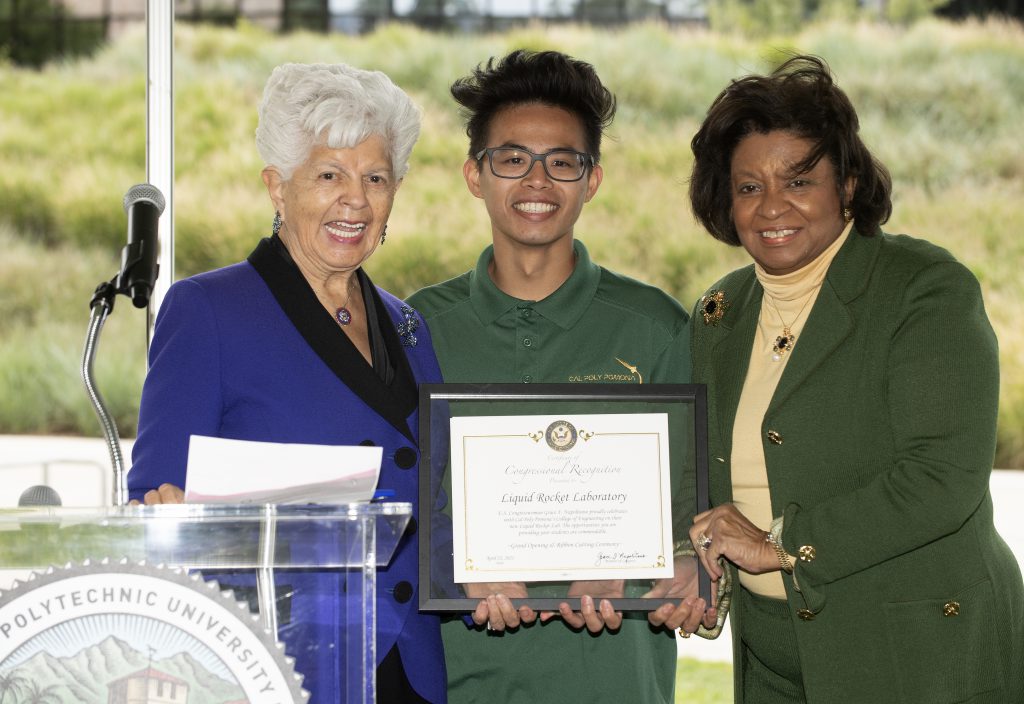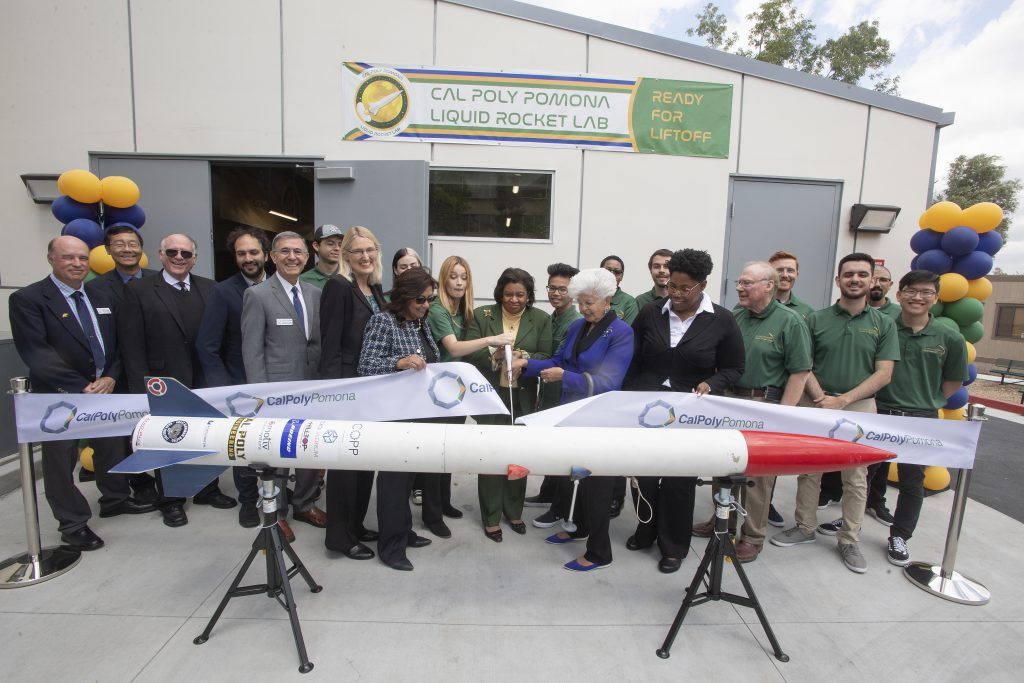It's not always easy being first.
However, the aerospace engineering students on a mission to become the first university to launch a liquid-fueled rocket into space are embracing their pioneering spirit.
Their efforts were celebrated on April 22 when Cal Poly Pomona and the College of Engineering hosted a grand opening for the new Liquid Rocket Lab (LRL). Elected leaders, students, faculty, staff, alumni and campus officials attended the ribbon cutting and toured the 2,100-square-foot laboratory in Building 13.
"The Liquid Rocket Lab offers our students a totally unique hands-on experience working on real world projects that prepare them to solve these complex problems that exist in the aerospace industry," said Frank Chandler, associate professor of aerospace propulsion and the LRL director. "When an employer sees that a student has been doing practical work in the Liquid Rocket Lab and find out what all they do, the students get hired almost directly."
During the grand opening, visitors stopped by the various stations in the lab, peering into the window of a 3-D printer, checking out schematics on computer screens and getting a close-up look at the Bronco-1 rocket.
For Melody Neu, president of the Liquid Rocket Lab club and one of the project captains, the dream of a career in the aerospace industry started at age 5 when she imagined herself as an astronaut and only grew as she watched shows like "Myth Busters" and movies like "Interstellar." The senior aerospace engineering student will take that passion to Virgin Orbit, who hired her to be a propulsion components test engineer after graduation. It's an opportunity to make her mark in the burgeoning race to commercialize space and make sure any exploration of other planets is done ethically and sustainably, Neu said during the tour.
"The Liquid Rocket Lab program has had an immeasurable impact on student learning and my career at Cal Poly Pomona," she said. "The hands-on experience I've gained through this project has directly prepared me in securing this dream career. I think the Liquid Rocket Lab project is the absolute embodiment of the learn-by-doing philosophy and I'm so grateful for my time here."
The effort to open the lab and build the rocket goes back to 2017 when the university entered the FAR-Mars Society Launch Contest, with FAR standing for Friends of Amateur Rocketry. The contest involved students building a liquid rocket and vying to achieve an altitude of 45,000 feet.
The Diamond Bar-based nonprofit National College Resources Foundation (NCRF), which focuses on increasing higher education opportunities and success for underserved and underrepresented students, gifted the program $1.67 million that year. The foundation's founder, Theresa Price, spoke at the grand opening event, recalling how as a young girl, she visited two of her brothers who attended Cal Poly Pomona.
Price said she is empowered and inspired by the students in the program and is especially gratified to see the growing diversity in STEM.
"The reason why I do this is I want to make a difference," she said. "In our life, it really is short. … What are you doing to make an impact on the world? The reason why I raise money is … to help enhance, encourage, motivate and inspire. That's what today is all about."
Subsequent funding has come from the federal government, thanks to the efforts of U.S. Congresswomen Norma Torres and Grace Napolitano, who helped secure an Educational Partnership Agreement between Cal Poly Pomona and Cal Poly San Luis Obispo and the Air Force Research Labs. The two universities split $25 million over four years, with Cal Poly Pomona using its half for the rocket lab. Other donors have stepped up to help, including Boeing.
University President Soraya M. Coley called the students involved in the lab to come forward and stand alongside her, and she talked about how Cal Poly Pomona's ambition took it from offering three agricultural-related courses of study at its start 84 years ago to providing the full breadth of academic opportunities today.
"Taking on different challenges allows us to explore our full potential and forces us to think big, bigger than we have ever thought before. Great tests bring out the best in us, and without a doubt, the Liquid Rocket Lab brings outs the best in Cal Poly Pomona," she said. "Like opportunities found in each of our colleges, the lab fosters collaboration. It requires new thinking. It requires crossing the boundaries of academic disciplines. It rewards hard work and patience. It allows us to exalt in our victories and provides chances to learn when we don't hit the mark."








